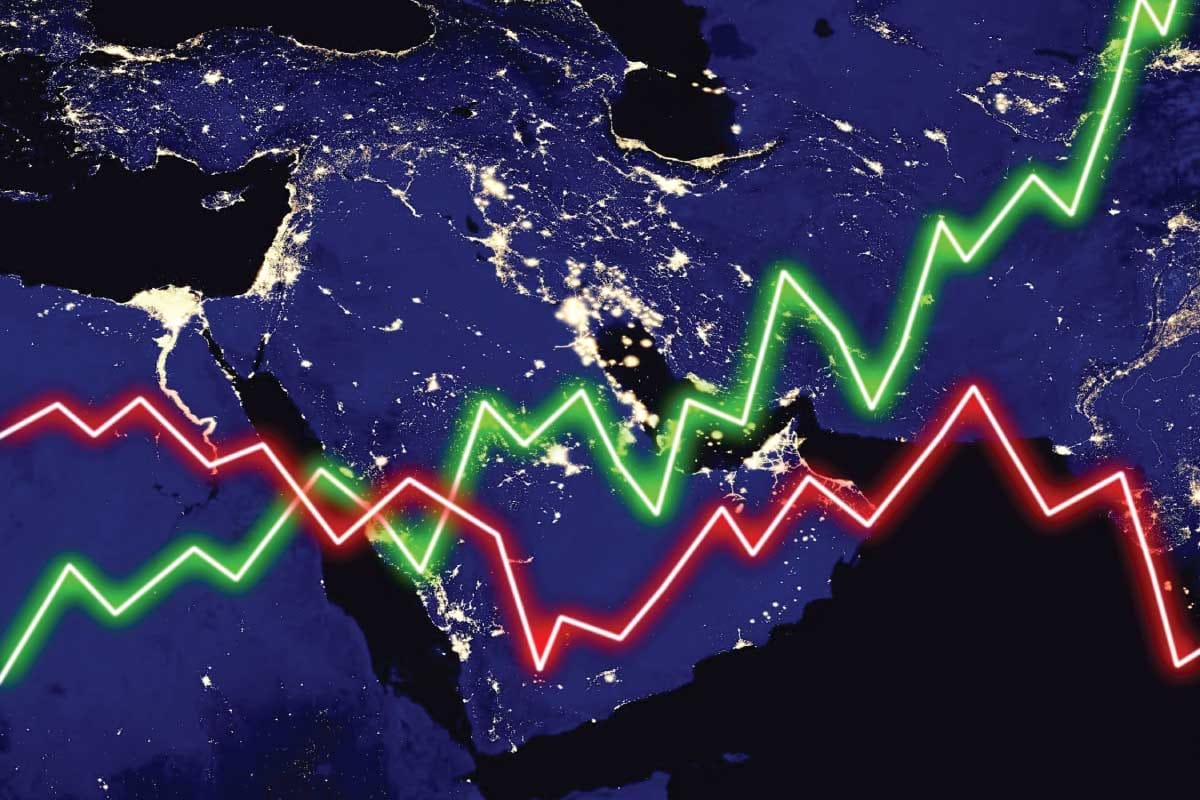In the aftermath of the COP28 climate conference and with the recent invitation for the UAE and Saudi Arabia to join the ‘BRICS’ club of emerging nations, raising the region’s profile, the importance of economies in the Middle East remains in the spotlight. What does an approaching era of peak oil demand hold for the region in the coming months?
The Gulf Cooperation Council nations – Saudi Arabia, the UAE, Kuwait, Bahrain, Oman, and Qatar – punch above their weight economically. They account for less than 1 percent of the global population but around 2 percent of global GDP and over 10 percent and 20 percent of gas and oil production, respectively. Curbs on Russia’s trade in hydrocarbons have increased their clout as alternative suppliers in energy markets, and events such as the football World Cup, the Dubai Expo, and COP28 have had a clear impact in elevating their status as international hubs. GCC countries are making efforts to maintain strategic flexibility despite a decoupling of global geopolitical blocs led by the US and China. Last summer, Saudi Arabia and the UAE were asked to join the BRICS, a geopolitical club that loosely joins some of the world’s largest and fastest-growing economies.
Oil scenarios and geopolitical landscape
A gradual reversal of oil output cuts for some GCC economies, together with eventual rate cuts, is likely to lead to a modest economic growth rebound in 2024 in the Middle East. As estimated by Economist Intelligence’s latest Middle East outlook report, economic growth in the region is expected to rise by just under 3 percent in 2024, following an estimated growth of 1.8 percent in 2023, shrugging off the slowing global economy. This positive outlook for the region also responds to stable solvency metrics, a strong demographic profile, and reform progress.
Amid elevated geopolitical risks but with slowing global demand growth and ample supply, we think Brent crude oil should trade at the lower end of $80 to $90 per barrel range in the coming months, and towards the middle of this range from mid-year. Scenarios in which oil production in the Middle East could be affected, including any retaliatory production cuts or embargoes by oil-producing states, are unlikely, as these would signal an overhaul of the region’s strategic order. More importantly, an additional large supply-side shock for crude oil and natural gas would incentivize U.S. shale producers to expand their capacities and market share, which may only partially offset the initial volume shock while accelerating the global demand shift towards renewable energy and electric vehicles. In our view, in 2024, GCC countries should ultimately strive to avoid regional escalation and maintain current oil output behavior.
Read: IMF lifts 2024 global growth outlook
Inflation and economic diversification
Inflation in the region should continue to dip in 2024, following rapid interest rate hiking cycles. Pegs to the U.S. dollar – or a basket of currencies, including the U.S. dollar in Kuwait – tie GCC monetary policy decisions to those of the Federal Reserve. Recently, trends in the U.S. and GCC economies have broadly coincided, making rate rises an appropriate response to GCC growth and inflation dynamics. In the coming months, the region’s monetary authorities might intervene in the money market to cap intermittent liquidity squeezes. In the UAE, particularly, authorities will be ready to adjust real estate sector regulations instead of monetary policy to limit the downside risks in Dubai property prices that are likely to see the negative impact of rising rates.
Despite the latest initiatives to deepen the region’s financial links to China and other emerging markets, the GCC countries have been maintaining significant dollar reserves to defend their pegs. Although the countries’ international reserves have declined in the past few years, their levels still exceed those in many other regions. An imminent shift in policy on the currency pegs is highly unlikely in 2024, particularly given that US rates have peaked.
In the coming months, diversification away from hydrocarbon production will be key to the region’s economic prospects, where National ‘Visions’ will act as catalysts for coordinated investments into non-oil and gas sectors. As a result, the pursuit of national economic transformation agendas – including human capital development and greening of energy supply – will be the main driving force for the GCC countries’ policies in 2024.
Prioritizing Vision-aligned projects
GCC nations’ commitment to these plans looks solid as the region faces challenges from the global shift toward electric vehicles and clean energy. Expected peak oil demand in the next 5-10 years is a potent challenge for the GCC countries, where 30 to 50 percent of GDP is related to the hydrocarbon sector. The region’s oil price sensitivity will be particularly high in the coming years, leading to a prioritization of the financing and facilitation of projects that align with national Visions.
The region is witnessing a steady growth of investments in these projects. In Saudi Arabia, for example, investments in tourism and entertainment sectors will continue to accelerate in 2024. Public sector investments in the UAE will continue to jump in 2024 as the country leads the region in solar energy investment. In the coming months, how effectively these projects are carried out will depend heavily on reforms of fiscal frameworks, the energy sector, and labor market structures, areas where the region has recorded substantial improvement in recent years.

For more op-eds, click here.




